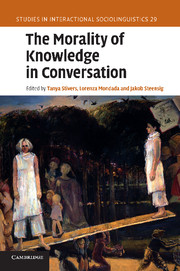Book contents
- Frontmatter
- Contents
- Contributors
- Preface
- Acknowledgements
- List of transcription and glossing symbols
- Part I Introduction
- 1 Knowledge, morality and affiliation in social interaction
- Part II Affiliational consequences of managing epistemic asymmetries
- Part III Epistemic resources for managing affi liation and alignment
- Part IV Toward a framework
- References
- Index
1 - Knowledge, morality and affiliation in social interaction
Published online by Cambridge University Press: 05 November 2011
- Frontmatter
- Contents
- Contributors
- Preface
- Acknowledgements
- List of transcription and glossing symbols
- Part I Introduction
- 1 Knowledge, morality and affiliation in social interaction
- Part II Affiliational consequences of managing epistemic asymmetries
- Part III Epistemic resources for managing affi liation and alignment
- Part IV Toward a framework
- References
- Index
Summary
Introduction
In everyday social interaction, knowledge displays and negotiations are ubiquitous. At issue is whether we have epistemic access to some state of affairs, but also how certain we are about what we know, our relative authority and our differential rights and responsibilities with respect to this knowledge. Implicit in this conceptualization is that knowledge is dynamic, graded and multi-dimensional and that our deployment of and reliance on epistemic resources are normatively organized. As Drew puts it, there is a “conventional ascription of warrantable rights or entitlements over the possession and use of certain kinds of knowledge” (1991: 45). As in any normatively organized system, we can and do hold one another accountable for justifiably asserting our rights and fulfilling our obligations with respect to knowledge. It is in this way that we see the epistemic domain as morally ordered.
This orientation to and monitoring of the moral order might seem completely different from the moral reasoning used in tasks requiring judgements of whether a given scenario (e.g., about sharing resources or unintentionally killing someone) is morally acceptable or not (e.g., Hauser 2006; Henrich et al. 2004). However, the micro-level moral order can be understood as cut from the same cloth as other forms of moral reasoning. And these micro-interactional moral calibrations have critical consequences for our social relations, most directly through our moment-by-moment alignments and affiliations with others.
- Type
- Chapter
- Information
- The Morality of Knowledge in Conversation , pp. 3 - 24Publisher: Cambridge University PressPrint publication year: 2011
- 278
- Cited by

